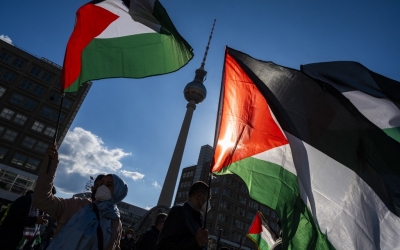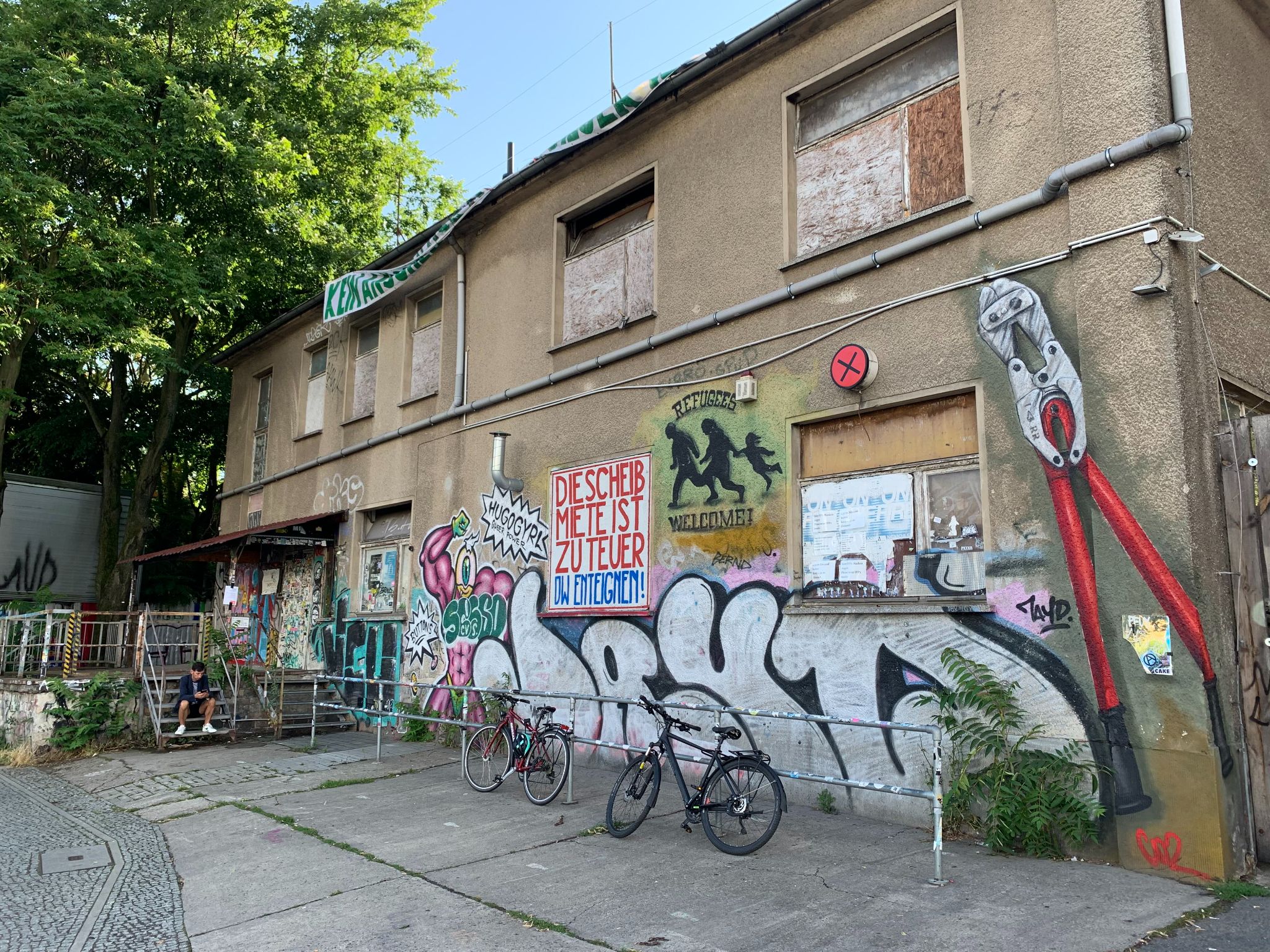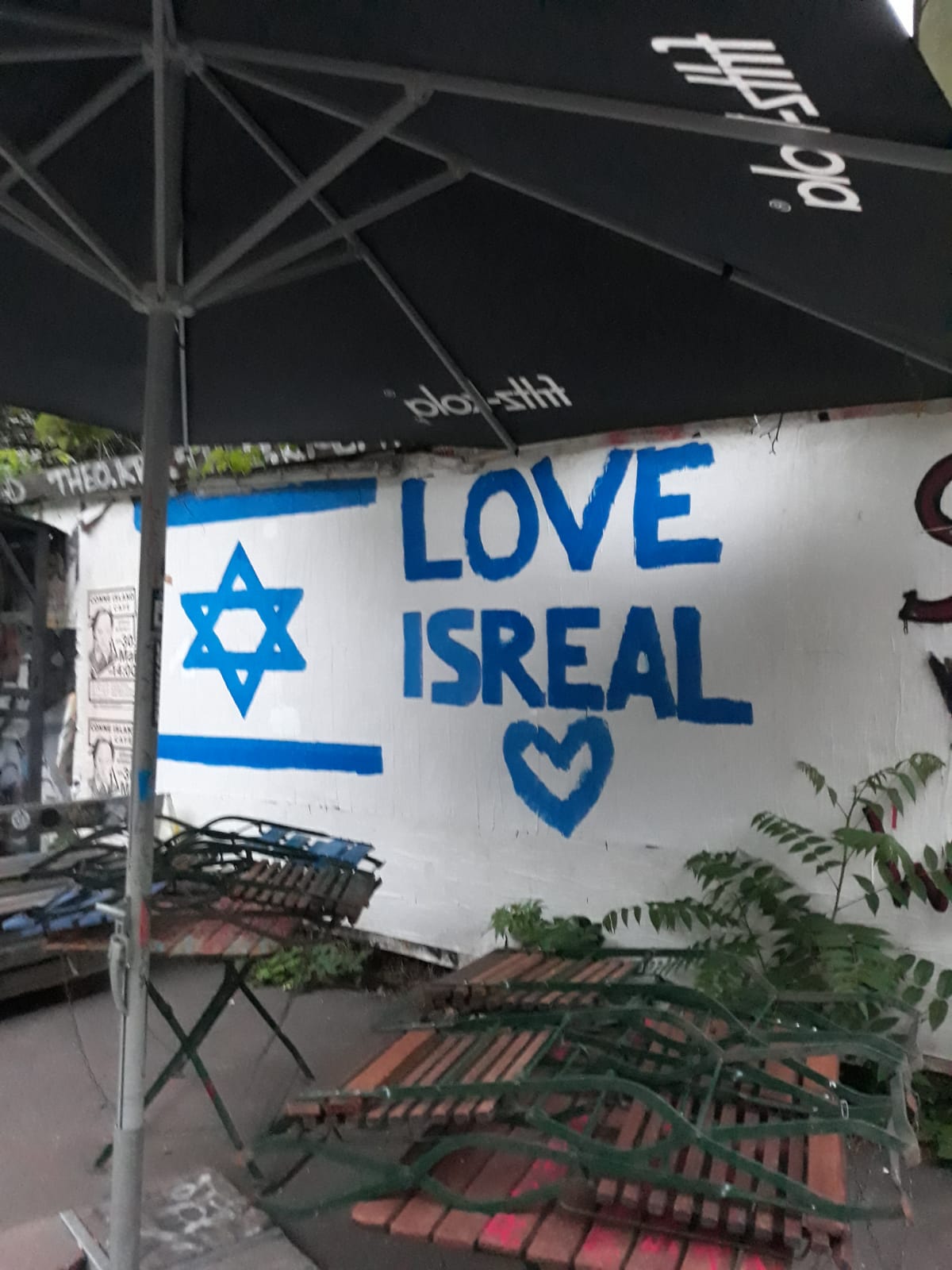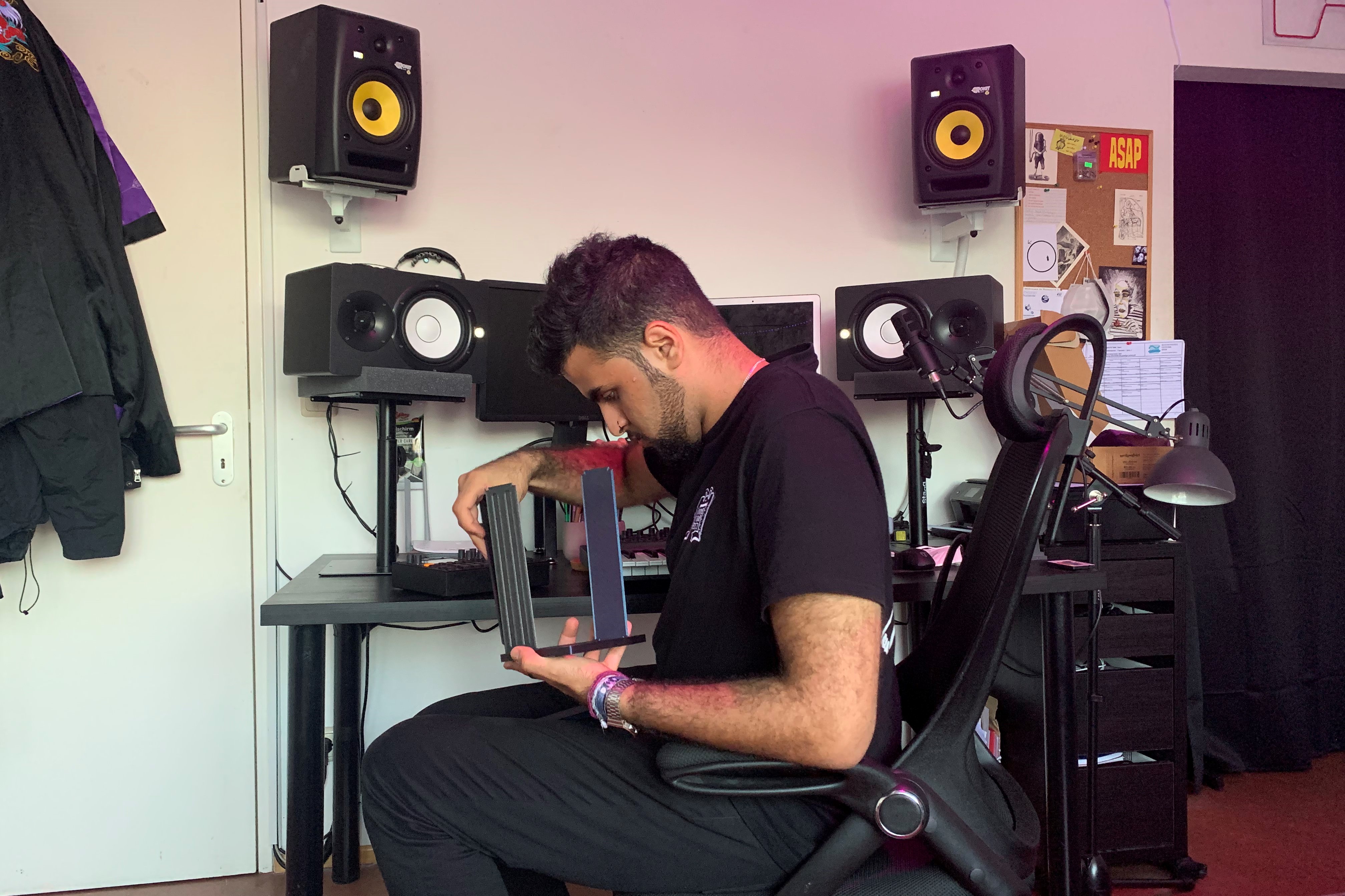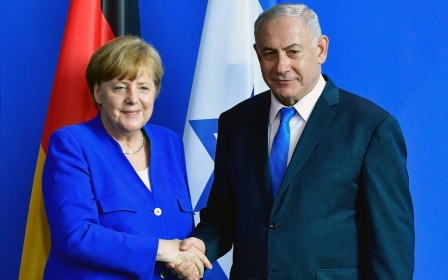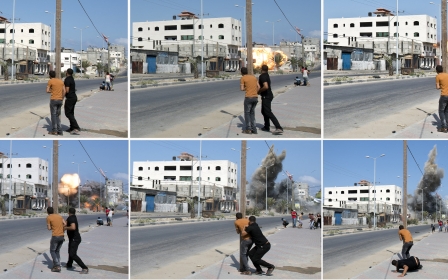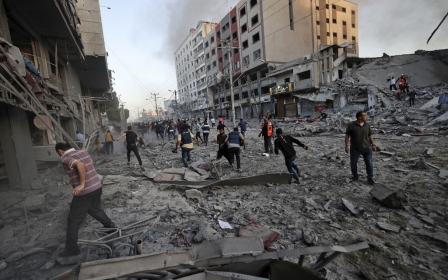In Berlin, the DJs for Palestine movement is growing
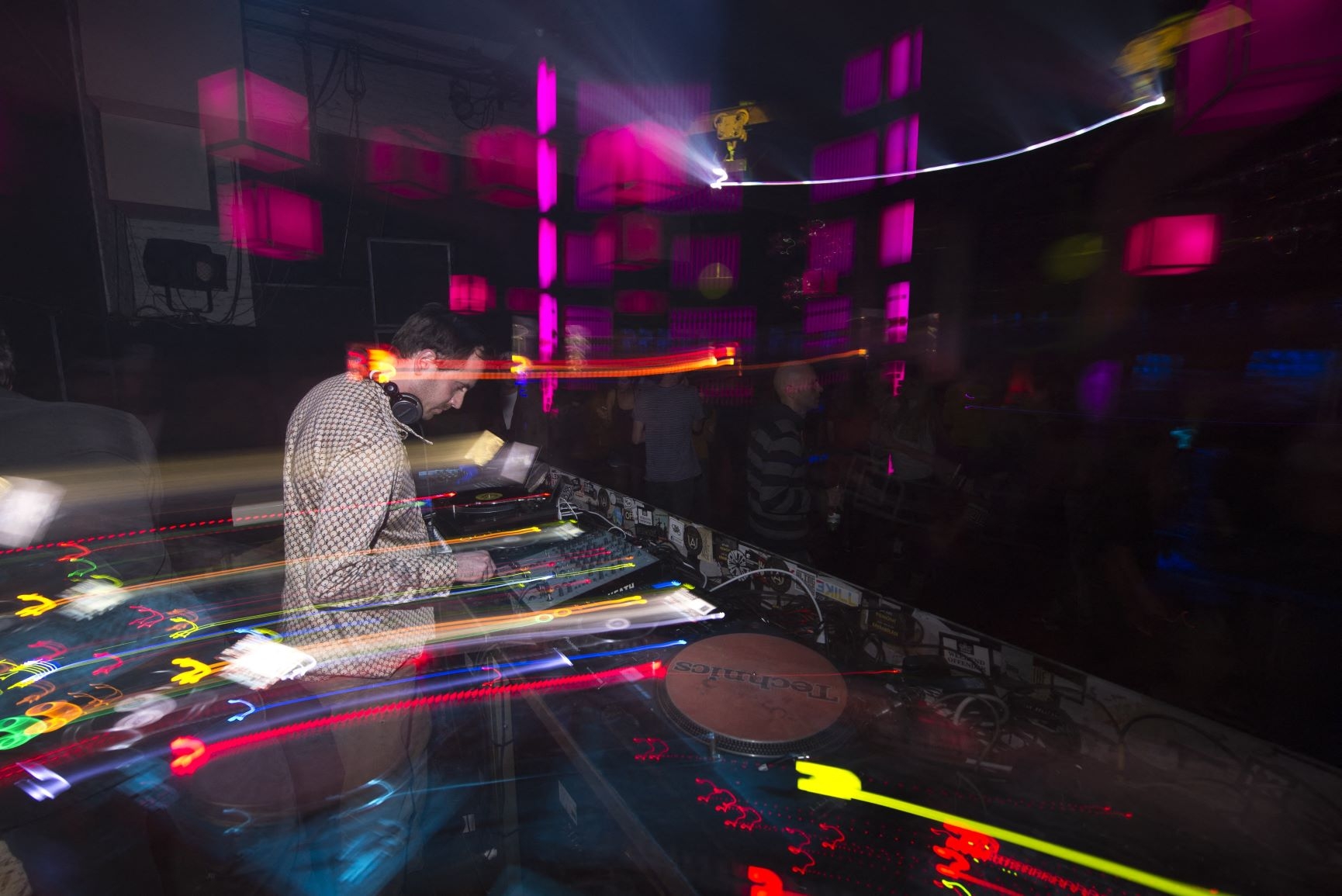
Two hundred metres from the towering Ostkreuz train station in Berlin’s eastern district of Friedrichshain, a few dozen DJs, event promoters and ravers from Berlin’s electronic music scene gathered in a nightclub garden.
The venue was ://about blank, a sprawling, graffiti-covered space and a well-known hub for progressive politics. Any given week it would host panels on feminism, anti-racism or anti-capitalism, sometimes with sounds of house or techno playing quietly through nearby speakers. On this warm August evening two years ago, the topic was Israel, cultural boycotts and the club scene.
New MEE newsletter: Jerusalem Dispatch
Sign up to get the latest insights and analysis on Israel-Palestine, alongside Turkey Unpacked and other MEE newsletters
On a makeshift stage, two panellists sat at the front of a mostly white, German crowd. One was Roy Siny, an Israeli events promoter, DJ and former Israeli soldier. The other was Perrine Sauviat, a French DJ, producer and BDS supporter advocating for the #DJsforPalestine wave rippling through Berlin’s clubs, a movement that has divided the scene.
One year earlier, ://about blank had cancelled an event by a collective who refused to retract a statement supporting BDS.
“Everyone here shares queer, feminist, anti-capitalist and anti-racist values,” Sauviat said to the hostile audience. “But when it comes to Israel, there’s a double standard and everything else goes out the window.”
Sauviat spoke for the thousands of foreign DJs, promoters and clubbers who help make Berlin’s electronic music scene one of the most progressive, forward-thinking cultural hubs in the world - and who are at odds with the German left’s unshakable support for Israel.
This uniquely German pro-Israel stance stretches deep into left-wing politics and the so-called Antideutsche, a mostly East German movement that blends electronic music, radical leftist ideals and support for Israel under the banner Gegen jeden Antisemitismus, or “against all antisemitism”. This leads to Germans labelling Jewish activists they disagree with as antisemitic and venues like ://about blank banning keffiyehs, a Palestinian symbol of resistance.
“It seems like you're talking to any other radical leftist about a topic,” an Israeli bartender said in 2018. “But as soon as you start talking about the Israel-Palestine conflict it’s like you’re suddenly arguing with a fascist from Israel.”
That’s never clearer than when Israeli fighter jets are bombing Palestinian schools, hospitals and apartment blocks. This May, after protests in Berlin about the scores of Palestinian civilians killed in occupied Gaza and the West Bank, ://about blank reminded the public of its position. “Gegen jeden Antisemitismus”, the club declared on Instagram, a slogan that’s become the German equivalent of All Lives Matter.
“The core element of left-wing antisemitism - the demonisation of Israel - is being widely shared on social media and is spilling into our bubble,” the club wrote.
‘Solidarity with Israel’
The sentiment isn’t confined to Berlin. Leipzig’s Institut fur Zukunft, a self-dubbed “progressive club for electronic music”, promoted a “Solidarity With Israel” rally. This happens against a backdrop where, rather than reporting accurately on Israel’s actions in Palestine, German politicians and the media obsesses over antisemitism within Muslim and immigrant communities at home.
But the pro-Israel statements from clubs haven’t gone unanswered, so the ideological clash seen in ://about blank’s garden is now playing out online: Germans on one side and the music scene’s increasingly international community on the other.
On 22 June, ://about blank’s most popular event series, Buttons, announced it would be leaving the venue over its pro-Israel stance.
'It has no longer been possible to welcome the communities into ://about blank we’d like to welcome given their stance on Israel'
- Buttons
“There has always been something lingering underneath the surface that does not fit with our ethos of radical acceptance,” Buttons said. “It has no longer been possible to welcome the communities into ://about blank we’d like to welcome given their stance on Israel,” adding that Palestinians and DJs and collectives of colour had been mistreated by the club.
Buttons and many of the city’s other beloved event series - Gegen, Cocktail d'Amore, Room 4 Resistance, Lecken - are driving a new campaign called Berlin Nightlife Workers Against Apartheid, set up to highlight what its founders said was Germany’s complicity with the systemic oppression of Palestinian people.
“We saw how ://about blank supported the government of Israel’s right to self-defence, disregarding the unbalanced use of power,” says Fabio Boxikus, a techno promoter. “As a queer community, we fight every day against obstructive and patriarchal governments just to have some of the most obvious rights recognised.”
'Adding voices'
In Berlin, left-wing politics and clubbing have been inseparable since the anarchist squat raves in the early 1990s after the fall of the Berlin Wall.
Decades later, the club scene still assembles as a collective political voice. In 2018, a group of venues came together with rainbow flags and sound systems to protest against the far-right German political party Alternative fur Deutschland. Many clubs have “Refugees Welcome'' stickers plastered near the entrance and, pre-Covid, you could attend some well-meaning fundraiser almost every weekend.
Venues strive to be safe spaces for the scene’s sizeable queer community. Berlin’s most famous club, Berghain, is a gay venue, and many of the country’s other spaces put inclusivity at the centre of their policies.
In recent years, a new wave of politically minded crews came to the city and set up events of their own, including Room 4 Resistance, the collective who kickstarted Berlin’s DJs for Palestine wave in 2018.
“We joined the DJs for Palestine campaign in order to add our voices to the others who were drawing attention to the reality of the oppressive conditions experienced by people living in the occupied territories,” the collective said in an email. “We hoped that as part of a collective action we could encourage people to learn the facts about the situation.”
In the same way, some of the club scene’s connection to the Israeli occupation is more than ideological - it’s tangible. BDS targeted Conne Island, Leipzig’s answer to ://about blank, after it published a recruitment call for Germans to volunteer for the Israeli army. “It’s like a holiday,” the club said.
At Conne Island, clubbers smoke weed and sway to deep house next to a garden wall painted with the Israeli flag. It’s also not uncommon to hear of Israeli army flags hanging in apartments of German leftists.
When approached for comment for this piece, Conne Island referred Middle East Eye to its 2018 statement on “the antisemitic nature” of the BDS campaign. It suggests the demand for a right of return for Palestinian refugees is inherently antisemitic, as there is “no ’human right’ for going back to a place where one's great-grandparents were exiled but oneself never put a foot”. The crowd in the ://about blank garden said the same thing two years ago.
June’s pro-Palestine statements from Buttons, Room 4 Resistance and others were overwhelmingly well-received on social media - far more than any pro-Israel statements they rebutted.
But some in the scene defended those clubs, including Roy Siny, the Israeli DJ also known as Marion Cobretti, who debated with Perrine Sauviat over BDS in the ://about blank garden. In a statement posted on Facebook, the club’s unofficial Israel-Palestine spokesperson said he didn’t think “boycotts are the solution” and that Buttons’ statement was “drowning in an ocean of uneducated cliches”. He declined to answer any follow-up questions.
A few weeks earlier, on 23 May, Siny had targeted pro-Palestine protests in Berlin with an anti-Arab, racist take of his own. He suggested that, during the 2015 European migrant crisis, German authorities hadn’t done sufficient background checks on Syrian asylum seekers with “beliefs, political views and religious habits” that may “never conform with democratic values”.
You might’ve heard the same thing in a speech from a far-right Alternative fur Deutschland candidate.
Other links between the Israeli army and the Berlin scene include Nathan Micay, a well-known Canadian DJ and musician formerly known as Bwana, who volunteered in Israel in 2008. He declined to comment for this article.
Mor Elian and Elad Magdasi, the Berlin-based Israeli DJs who were booked to play at ://about blank this summer, declined to comment. Agents for the high-profile Israeli DJs Dr Rubinstein and Roi Perez did not respond to interview requests.
‘The first time I’ve felt hope’
Yazan Arori, a 21-year-old Palestinian house DJ based in Berlin, was in Ramallah in the occupied West Bank for most of May. He made the 23-hour trip home from Berlin one week before Israeli forces stormed al-Aqsa Mosque on the last Friday of Ramadan, flying to Budapest before taking a Ryanair flight to Amman, Jordan, to begin the tiresome process of passing through Jordanian, Israeli and Palestinian Authority checkpoints and passport control.
“I actually went to visit my mum and get vaccinated,” he told me over the phone. “Then all the shit went down.”
Arori’s month in Ramallah was a long way from the 2019 talk in the ://about blank garden, where he was the only Palestinian in the crowd. Then aged 19 and probably the youngest person there, he planned only to listen, but eventually made his way to the stage. Arori took the microphone after someone outlined why BDS’s demand for the right of return for Palestinian refugees was obviously antisemitic.
“I always used to try not to be political or get involved, which was a privilege I had while living in Palestine,” he says. “But since I moved to Berlin, I’m not just an engineer, DJ or producer, but a Palestinian.
"When that had a direct effect on my opportunities, I realised the privilege I had was fake. My existence is political. I was cool with the talk at ://about blank because it opened up some dialogue, but I didn’t understand why they were so angry. None of them was directly affected by this.”
A Palestinian DJ with friends killed by Israeli soldiers had met his first Antideutsche.
'Since I moved to Berlin, I’m not just an engineer, DJ or producer, but a Palestinian. When that had a direct effect on my opportunities, I realised the privilege I had was fake'
- Yazan Arori, Palestinian DJ
Arori is well over six feet tall, but speaks softly. He’s been DJing since he played Shakira and Pitbull mp3s for a friend’s 13th birthday as a nine-year-old, and would rather talk about rewiring speakers and underground raves in Ramallah than BDS and the Israeli occupation.
As the world watched Israeli soldiers target protesters in the occupied West Bank with tear gas and live bullets, Arori was at home, calmly studying for his electrical engineering exams and applying for jobs in Berlin.
“It’s been like that since I was born, so I’m used to it,” he says. “When I was 15, they shot my friend dead on the street. They wouldn’t allow anyone to go and help him. It was the anniversary of the Nakba and there was a protest - but he wasn’t taking part. He was just walking nearby wearing a keffiyeh and that's enough reason for the IDF [Israeli army] to murder you."
Despite many requests, Arori has refused to visit or DJ at ://about blank since that night in the garden. He’s friends with some of the crew behind Buttons, but never attended one of their parties. That will change once clubbing settles into a post-pandemic normal, whenever Buttons finds a new venue.
“I messaged them to say I could finally come to their party,” Arori says. “I’m really happy with the stance some DJs have been taking in Berlin, as it’s clearer where everyone stands against this colonial occupation regime.”
In what may be the most international cultural scene in Germany, views like Antideutsche’s in the nightclub garden have never felt more isolated. With time, the cultural backlash primarily driven by foreigners and people of colour will spread beyond the relatively obscure world of electronic music and into other scenes lacking alternative perspectives and nuance around the Israel-Palestine discourse.
“In 21 years, this is the first time I’ve felt hope,” Arori says. “We had some control over the narrative and weren’t silenced as much.”
Middle East Eye delivers independent and unrivalled coverage and analysis of the Middle East, North Africa and beyond. To learn more about republishing this content and the associated fees, please fill out this form. More about MEE can be found here.


